-
by Admin
15 February 2026 2:36 AM



In a significant ruling, the Punjab & Haryana High Court has quashed penalties imposed on Simran Medical Agencies and Cap Tab Biotech for the alleged undervaluation of goods in transit. The bench, comprising Justices Sanjeev Prakash Sharma and Sanjay Vashisth, ruled that the roadside checking authorities acted without proper jurisdiction when they imposed penalties based on assumed undervaluation. The court underscored that the actual valuation of goods should only be determined by the assessing authority after due procedure.
Simran Medical Agencies and Cap Tab Biotech, both engaged in the distribution of medicines, were transporting pharmaceuticals from Himachal Pradesh to Chandigarh when the goods were stopped at a checkpoint. Upon inspection, the officials noted a discrepancy between the Maximum Retail Price (MRP) printed on the medicine packs and the price shown on the invoice. The authorities, suspecting an attempt to evade taxes, imposed penalties under Section 51(7)(b) of the Punjab VAT Act, 2005, on the basis that the goods were undervalued, allegedly to evade tax due to the Union Territory of Chandigarh.
The appellate tribunal upheld the penalties, prompting the companies to approach the High Court.
The court observed that while authorities may check goods in transit, the power to determine the actual valuation of goods lies solely with the assessing officer. “The imposition of penalty by a roadside checking officer is beyond jurisdiction, as the actual sale price and the liability to tax can only be determined when the sale is made,” the bench noted.
The court rejected the presumption that the goods were undervalued solely based on the difference between the MRP and the invoice price. The court found that the appellants had purchased goods from a manufacturer in Himachal Pradesh, where excise duty was exempted, resulting in lower prices. It held that simply assuming undervaluation from the MRP was insufficient to prove an intent to evade tax.
The High Court termed the assumption of tax evasion at the transit stage as "far-fetched." It ruled that imposing penalties on the basis of the MRP was inappropriate, as the goods were not being sold directly to consumers but were to be further distributed, and thus the price at which they were purchased was legitimate.
The court emphasized that, “to presume evasion of tax at the level of a dealer intending to sell to a distributor is an overreach and constitutes an arbitrary use of power by the authorities.”
The court examined the provisions under Section 51(7) of the Punjab VAT Act, 2005, alongside earlier precedents. It referenced the Supreme Court’s ruling in Rajasthan Chemists Association v. State of Rajasthan, which held that tax must be based on the actual sale price and not on presumptions of future sales or anticipated profits. In light of these precedents, the court ruled that the penalty imposed was unjustified and quashed it.
“The action of the respondents imposing penalty on such a presumption would be an exercise of arbitrary power,” the bench stated, stressing that the assumption of undervaluation without proper assessment is untenable.
The High Court’s decision reaffirms the principle that penalties for tax evasion cannot be imposed on speculative grounds. By quashing the penalty, the court has set a strong precedent for the treatment of goods in transit and the role of roadside authorities. This judgment is expected to impact future cases involving assumptions of undervaluation based on MRP, especially in industries like pharmaceuticals, where prices vary significantly at different stages of the supply chain.
Date of Decision: August 28, 2024.
M/s Simran Medical Agencies v. The Union Territory of Chandigarh & Ors.
